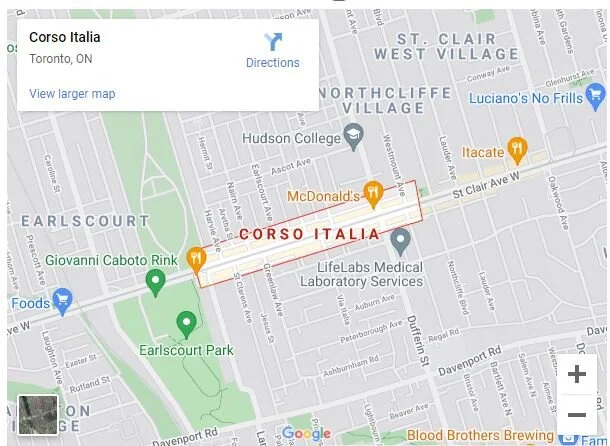
Corso Italia, Toronto's Little Italy 2.0, is lower-key then its more famous namesake and absent the seemingly growing list of martini bars that now shape College Street. The Italian community here is more focused on the food. Some of the best pizza in the city can be found at spots like the Big Ragu and Marcello's.
THE HISTORY OF CORSO ITALIA
The history of the Corso Italia neighbourhood stretches back to the shores of the glacial Lake Iroquois, which carved out the Davenport Bluffs during the last Ice Age. Generations of families have made their homes here for over 10,000 years. Since the nineteenth century, Corso Italia has served as an entryway into Toronto for thousands of immigrants and newcomers to Canada.
The community is the eastern half of what was earlier known as Earlscourt. Earlscourt was originally settled by British immigrants in 1906, and was annexed by the City of Toronto in 1910.
By the 1970s, Italian immigrants from Little Italy on College Street, moved northward to St. Clair Avenue. One of the largest celebrations on St. Clair Avenue West was when Italy won the 1982 FIFA World Cup, which involved an estimated 300,000 fans, shutting the street down for nearly 20 blocks between Caledonia and Oakwood. In 1981, about 35,000 Italians lived in this area, however, by 1991, had dropped to 20,000. Although the character of Corso Italia is still Italian, the demographics of this neighbourhood have changed drastically with a smaller Italian population than originally. Much of the Italian population has moved to the suburbs northwest of Toronto, in particular, Vaughan, King, and Caledon.
LIVING IN CORSO ITALIA
Corso Italia is a family-friendly neighbourhood with a strong commercial legacy that has recently been reignited. Alive with history at every turn and welcoming to all, Corso Italia is both a destination neighbourhood and a place to call home.
Just like its residents, Corso Italia has continued to evolve through the years. At one time the largest Italian community in the city, Corso was the destination for shoes and wedding dresses, cafés and espresso. It was also a welcoming community. Later, new Canadians from Portugal and Latin America moved to the area, adding Spanish and Portuguese to the Italian neighbourhood’s mix.
Today, Corso Italia is a vibrant mixed community of young families, single people, and retired couples. While fewer new immigrant families are settling in the neighbourhood, over three-quarters of the residents are first- or second-generation immigrants. Today, Corso Italia is a neighbourhood in transition, rich in opportunities for current and new residents. It remains a place of welcome and a home for all.
CORSO ITALIA REAL ESTATE
The most common type of home here is the low-rise detached home, followed closely by townhouses. While condos are not commonly seen here, renting is as common in Corso Italia as buying. Most homes here were built pre-1980s and the historic architecture can be seen to this day. The neighbourhood boasts a fairly even split between families, singles and couples with a slightly larger family population than you might find downtown.
Looking for the best of Corso Italia?
Parks
Schools
Please click here for a comprehensive list of schools in Corso Italia.
Restaurants
CANO: Easygoing eatery with reclaimed wood paneling serving popular Italian fare with a focus on seafood.
Agio: Narrow, easygoing eatery offering Italian cuisine such as pastas and meat entrees plus desserts.
King’s Tacos: Casual Mexican eatery featuring ample tables a sizable menu of traditional meat and vegetarian fare.
Cafés
Tre Mari Bakery: Old-school family bakery for various Italian pastries, breads and coffee, plus deli offerings.
Wallace Espresso: Stay up to date with your favourite neighbour. We promise to keep you up to date with all the must know neighbourhood hood news from Corsa Italia. Which cute pooch stopped by the shop. Who is currently enjoying a coffee. All the important stuff.
Mofer Coffee: From crop to cup we believe in coffee excellence. That is why we source the best single origin premium Ethiopian coffee beans.







